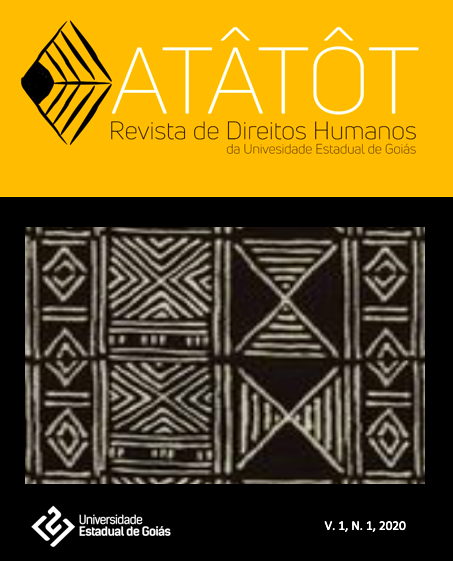Vol. 1 No. 1 (2020): jan./jun.(1)

Atâtôt – Interdisciplinary Journal of Human Rights of UEG is a biannual academic publication under the responsibility of the State University of Goiás. Its goal is to create interdisciplinary spaces for the publication of articles, essays, reviews, and other academic texts on the general theme of human rights, focusing on topics related to democracy, constitutional issues, and social struggles for rights.
In this launch issue, Atâtôt – Interdisciplinary Journal of Human Rights from UEG presents discussions on human rights from a critical perspective, bringing various viewpoints on the importance of social and political struggles for the realization of human rights in Brazil, Argentina, Mexico, and Italy.
The first article, "Dilemmas of Peace and Justice in Mexico in Times of Crisis of Democracy and Human Rights", by Prof. Dr. Rebecka Villanueva Ulfgard (Mora Institute, Mexico), reflects on the dilemmas of peace and justice in Latin America, currently in a crisis of democracy, in light of Sustainable Development Goal 16 (SDG 16). It carries out a critical analysis of some of the challenges present in the region that face the norms and principles underlying SDG 16, emphasizing, for this purpose, the case of Mexico through two cases that marked the country with respect to the struggle for justice for victims of violence; Ayotzinapa and Tlatlaya.
The second article, “Are Civil Society Organizations Accountable to their Beneficiaries? A Multiple Case Study Analysis on Italy”, by Prof. Dr. Domenico Carolei (University of Stirling, UK), investigates to what extent different types of civil society organizations (CSOs) practice the accountability of beneficiaries (transparency, participation and complaints procedure) within their own structure. It focuses the analysis on Italian CSOs.
The third article, "The role of Civil Society Organizations in the Fight for Human Rights and Democracy in Mexico", by Prof. Dr. Pablo Romo Cedano (UNAM, Mexico), analyzes the evolution of organizations specialized in human rights in civil society in Mexico, and argues that its growth and professionalization were achieved due to the great social movements that generated processes of great change in the country.
The fourth article, "Follow-up over Indigenous Lands in Pernambuco, Brazil: a diagnosis of the right to property of indigenous peoples", by Prof. Me. Luis Emmanuel Barbosa da Cunha (UFPE, Brazil) and Prof. Me. Jerfferson Amorim (Unicap-PE, Brazil), presents partial results of the monitoring project on the demarcation of indigenous lands in the State of Pernambuco, in order to evaluate the realization of the right to communal property and learn how the fundamental rights of indigenous peoples take place in Brazil.
The fifth article, "The Obstacles to the Identity Construction of Afro-descendants in the Brazilian Context", by the master student Sara Eugênia França (PPGIDH/NDH-UFG), discusses black identity and argues that its construction requires greater effort due to the negative reflections of slavery and structural racism that hinders the construction of an identity based on positive premises in Brazil.
The sixth article, "Reflections on a Concept of Human Dignity ", by the master student Ana Paula de Castro Neves (PPGIDH / NDH-UFG) and by Prof. Dr. Angelita Pereira de Lima (PPGIDH/NDH-UFG), addresses some reflections on a conception of human dignity, highlighting its fundamental value to human rights. In order to demonstrate the dimension of the principle of human dignity as an intrinsic value for all human beings, inserted in the nucleus of the fundamental rights of the Brazilian State.
Finally, there are two monographic works.
The first, "Women’s Struggles for the Decriminalization of Abortion in Brazil and Argentina", by master student Ana Karoline Dirino (PPGIDH/NDH-UFG), analyzes from a political point of view how disputes (struggles) have developed in the legal and social environment, as well as examines the strategies that have been adopted by feminist movements and by groups opposed to the decriminalization of abortion in Brazil and Argentina.
The second, "The Tax Benefits: Myths and Truths", by the Master and Fiscal Auditor of the Revenue of the State of Goiás, Cláudio Gonçalves Pacheco, verifies the myths and truths about the fiscal benefits from a human rights perspective, considering the practical repercussions of tax expenditures, especially in its much-appreciated socio-economic return, and the prospects of compromising the equitable allocation of tax revenues.









